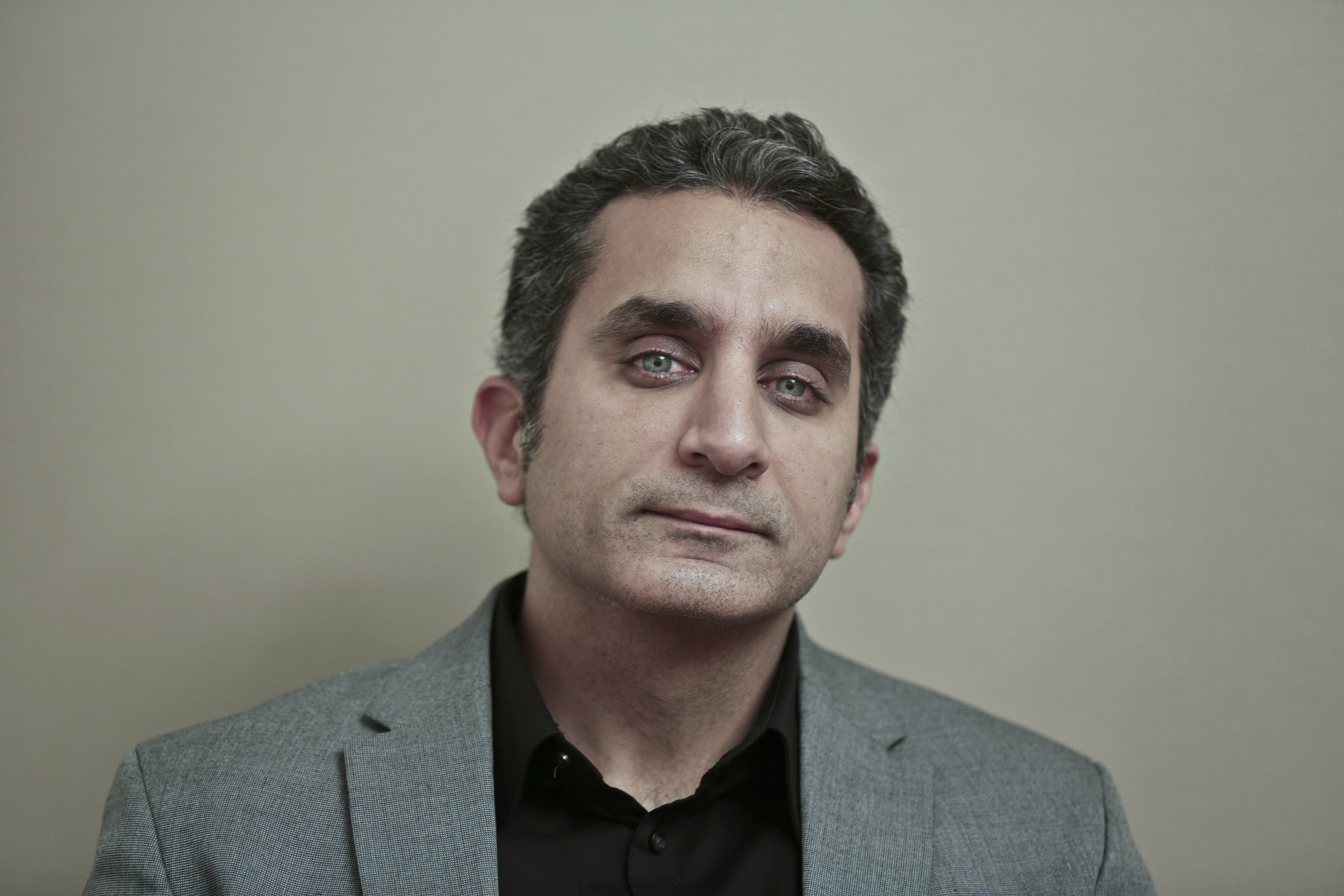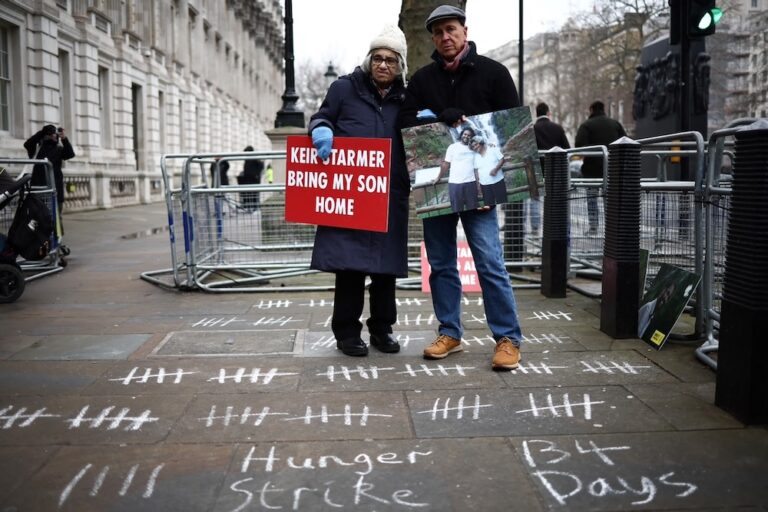In the midst of a widening crackdown on journalists critical of the military-backed government, Bassem Youssef treads carefully around the mention of Field Marshal Abdel Fattah el-Sisi during his debut appearance on MBC Misr Channel after a three-month absence from the small screen.
By Shahira Amin
With much anticipation, Egyptians huddled around their television sets on Friday night to watch their favourite comedian, Bassem Youssef, make his debut appearance on the Saudi-funded MBC Misr Channel after a three-month absence from the small screen.
Youssef’s fans were not disappointed: They were treated to a full hour of non-stop laughter as the satirist, often compared to US comedian John Stewart, took jibes at the current state of the media and at the Egyptian public’s infatuation with defence minister field marshall Abdel Fattah El Sisi. Youssef cracked jokes about how everything in the country revolves around El Sisi whose name crops up on practically every TV show including cookery and sports programmes.
Youssef opened the show with a pledge not to talk about “sensitive political issues” that had previously caused his satirical show Al Bernameg, The Programme, to be pulled off the air by the management of the privately-owned Egyptian CBC satellite channel. Minutes later, he reversed his decision. “What are we going to talk about?” he asked his studio audience before throwing caution to the wind and starting to poke fun at the Sisi-mania gripping the country. He stopped short however, of taking aim at El Sisi himself, making no secret of the fact that such action would provoke a negative response from the censors.
”It’s better we don’t mention him,” he said as a silhouette- image of the military chief appeared on the screen. “Not out of fear but out of respect,” he sarcastically retorted.
Youssef’s show Al Bernameg was suspended last October following a controversial episode that CBC administrators said had “violated editorial policies and caused discontent among viewers.” In that episode–his first appearance since Islamist president Mohamed Morsi was toppled by military-backed protests in July– Youssef had poked fun at the Egyptian public’s blind idolisation of General El Sisi, widely expected to become the country’s next president. That had been enough to land him in trouble.
Not only was the show pulled off the air, but Youssef was also lambasted mercilessly by pro-military supporters in both the traditional media and social media. The attacks on Youssef did not stop there: Criminal charges were brought against him by angry citizens who accused him of “insulting the military.”
The legal complaints lodged against Youssef in November were not the first time the popular satirist had been indicted. In March 2013, he was investigated by the public prosecutor on a set of charges ranging from “insulting Pakistan” to “spreading atheism” and “insulting Islam and the president.” The accusations against him were triggered by his persistent ridiculing of then-president Mohamed Morsi. In an episode of the show early last year, he appeared on the set wearing a gigantic hat similar to one worn by Morsi when he received an honorary doctorate from a Pakistani university. Youssef’s unabashed lampooning of the former president delighted the former president’s opponents while earning Youssef the wrath of his Islamist supporters.
Youssef was not convicted. After an investigation lasting five-hours, he was released on $2,200 bail and went right back to mocking Morsi.
His indictment triggered an international outcry, raising concerns over regression on the country’s hard won freedom of expression and press freedom. Little did anyone –let alone Youssef himself who later joined the June 30 protests demanding the downfall of the Muslim Brotherhood regime—suspect at the time that those freedoms would be further undermined and eroded by the military-backed regime that would replace Morsi three months later.
Since Morsi’s ouster, restrictions on the press have been even “greater than those imposed by either Morsi or his predecessor, autocrat Hosni Mubarak”, lament press freedom advocates and media analysts. The intimidation and harassment of journalists including increased physical assaults on them by security forces and by ordinary Egyptians supportive of the military, have raised concerns about the safety of journalists working in Egypt and press freedom in the country.
The indictment of 20 journalists – four of them foreign correspondents—has fuelled fears of a widening crackdown on journalists critical of the military-backed government. Eight of the defendants are journalists working with the Al Jazeera network –four of whom languish in prison on charges of “spreading false news and assisting or belonging to a terrorist organization.” Similar charges have been leveled against the sixteen other defendants in the case including Dutch journalist Rena Nejtes who last week, managed to flee the country, escaping arrest.
Sue Turton, one of two British defendants in what has come to be known as the “Al Jazeera case” told CNN on Friday that “the crackdown by the Egyptian authorities was targeting all journalists who do not tow the government line. ” She and fellow British defendant Dominic Kane are safely out of the country unlike Australian award-winning journalist Peter Greste who has been behind bars for six weeks. On Sunday, his parents made an impassioned appeal to Egyptian authorities for his release. Speaking to journalists in a press conference in Cairo, they described the accusations against him as “bizarre” and “ludicrous.” Juris Greste , Peter’s father, insisted his son’s detention was ” unfair and unjustifiable,” and urged prosecutors to release him immediately.
In a worldwide campaign to press for the release of the four Al Jazeera journalists, fellow-journalists from different countries across the globe have expressed solidarity with the defendants. They posted their own pictures on social media networks—with their mouths plastered ” to symbolize the Egyptian regime’s gagging of the press,” one campaigner explained via her Twitter account.
The detention of the Al Jazeera journalists is having a chilling effect on journalists working in Egypt, forcing many local journalists to practice self- censorship for fear of potential government reprisals. Others have fallen silent.
In the current hostile environment , it is not surprising that Youssef too is uncertain if he will be allowed to continue broadcasting his show. Wrapping up Friday’s episode, he asked “Second episode ?” before bursting out laughing. In the country’s repressive climate, no one can predict what might happen next.
This article was posted on 10 February 2014 at indexoncensorship.org



